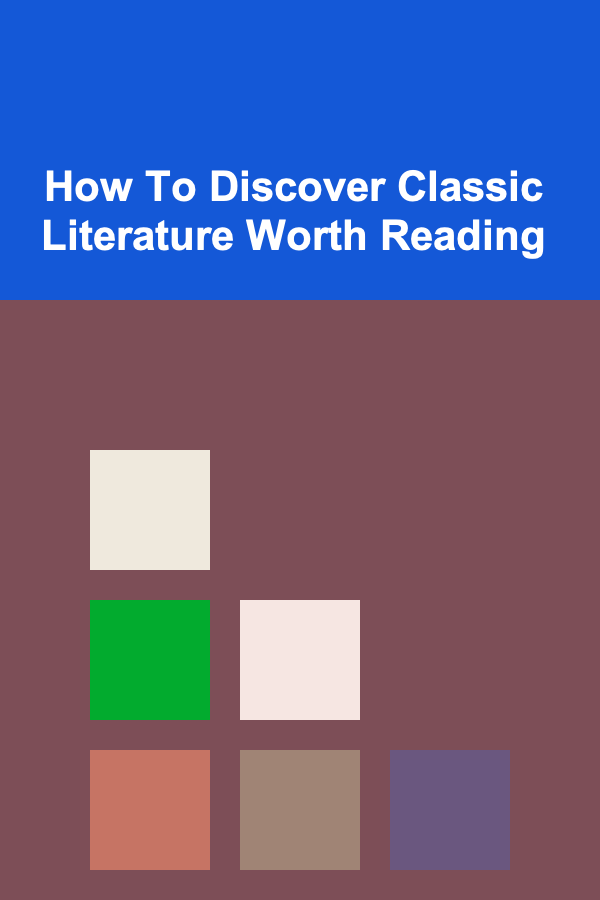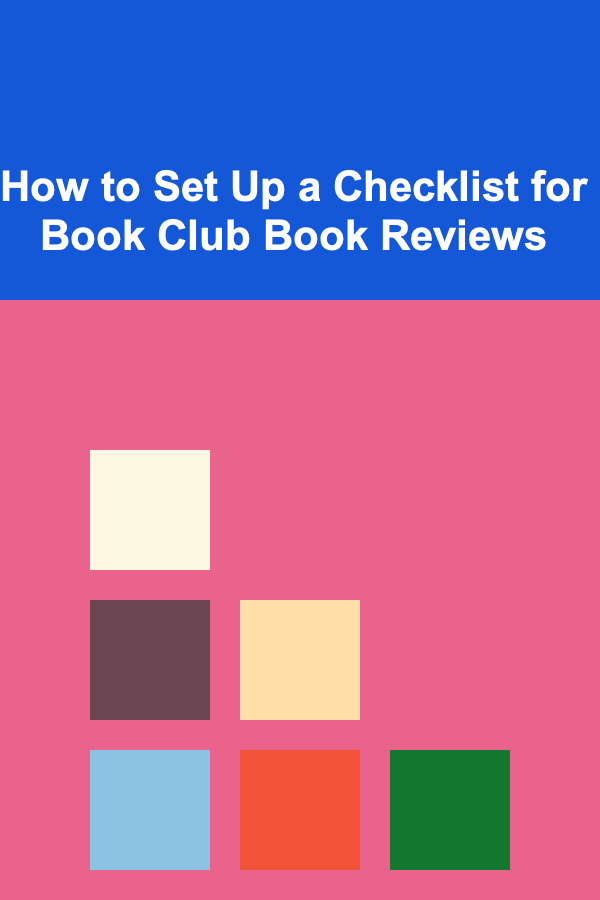
How To Discover Classic Literature Worth Reading
ebook include PDF & Audio bundle (Micro Guide)
$12.99$11.99
Limited Time Offer! Order within the next:

Classic literature is often regarded as the cornerstone of human intellectual development. It encompasses a wide range of works that have stood the test of time, offering readers profound insights into history, culture, philosophy, and the human experience. However, with the overwhelming abundance of literary works available today, it can be challenging to know where to start or which classics are truly worth reading. This article aims to guide you on how to discover classic literature that is not only intellectually enriching but also personally satisfying.
Understanding Classic Literature
Before diving into the discovery process, it's essential to understand what makes literature "classic." Classic literature is often defined as works that have remained relevant over time, consistently offering value to readers across generations. These works tend to explore universal themes---such as love, war, morality, death, and the nature of existence---that transcend specific cultural and historical contexts. Additionally, classics are celebrated for their literary quality, innovative techniques, and enduring impact on both literature and culture.
The concept of a "classic" is, however, subjective. What one person considers a classic might not resonate with another. Nevertheless, there are certain hallmarks that many classics share: depth of character, rich prose, philosophical insight, and narrative power. Works like Homer's The Iliad , Shakespeare's plays, and Dostoevsky's The Brothers Karamazov continue to be read today because they offer profound, timeless reflections on the human condition.
Step 1: Start with the Canon
A great way to begin your journey into classic literature is to explore the literary canon. The Western literary canon, for example, includes a set of texts that are often considered essential reading for understanding Western culture and thought. These works are often taught in universities and regarded as fundamental texts for any serious student of literature.
Key Western Classics to Explore:
- Homer's The Iliad and The Odyssey: These epic poems set the foundation for much of Western literature and explore the themes of heroism, fate, and human frailty.
- Shakespeare's Plays : Whether it's Hamlet , Macbeth , or Romeo and Juliet, Shakespeare's works are rich in language and delve deeply into human emotions and conflicts.
- Jane Austen's Pride and Prejudice and Emma: Austen's novels are celebrated for their wit, character development, and insights into the social structure of her time.
- Charles Dickens' Great Expectations and A Tale of Two Cities: Dickens captures the struggles of his time, focusing on the complexity of social classes, justice, and morality.
The literary canon, while not definitive, offers a solid foundation for anyone seeking to understand the development of Western literature. Starting with these works can give you a sense of how literature has evolved over the centuries.
Step 2: Seek Out Recommendations from Literary Critics and Scholars
One of the best ways to discover worthwhile classic literature is by tapping into the knowledge of literary critics, scholars, and reputable booklists. Literary critics and experts have spent years analyzing and interpreting texts and can provide valuable recommendations on which classics are most worth reading.
Notable Booklists and Resources:
- The Modern Library 100 Best Novels: This list compiles the top 100 English-language novels of the 20th century, providing a selection of works that span various genres and periods.
- The Penguin Classics Series: This series is an excellent starting point for discovering classic literature, as it includes a wide range of works from authors across the globe and is often accompanied by insightful introductions and notes.
- The Guardian's "The 100 Best Books of All Time": This list brings together some of the most respected works in literature, offering a mix of widely-read novels, poetry, and plays from various traditions.
In addition to these lists, many literary websites, blogs, and podcasts offer valuable recommendations for classic literature, often with insightful discussions and analyses that can help you determine which works are most relevant to your interests.
Step 3: Explore the Classics of Different Cultures
While Western classics are certainly influential, there is a wealth of classic literature outside of this tradition that is equally deserving of attention. Exploring works from different cultures allows you to broaden your perspective and gain a more comprehensive understanding of the human experience. Classic literature is not confined to the West, and the literary traditions of Asia, Africa, and the Middle East are rich with texts that have shaped their respective societies.
Key Non-Western Classics to Explore:
- Confucius' The Analects (China): This collection of sayings and ideas from Confucius is central to Chinese philosophy and has influenced generations of thinkers throughout East Asia.
- Homer's The Iliad and The Odyssey (Greece): A foundational work of Western culture and literature.
- Chinua Achebe's Things Fall Apart (Nigeria): This novel offers a powerful examination of colonialism, culture, and the clash between tradition and change in African society.
- Gabriel García Márquez's One Hundred Years of Solitude (Colombia): A masterpiece of magical realism that explores the cyclical nature of history and the complexities of Latin American culture.
By exploring classic works from around the world, you can discover narratives that may be unfamiliar but equally compelling and enlightening. These works may offer new perspectives on history, culture, and the human condition.
Step 4: Consider Personal Interests and Preferences
While classic literature often appeals to universal themes, it's important to consider your own personal interests and reading preferences when discovering new books. The great thing about classic literature is that there are classics for almost every genre and interest, whether you're drawn to historical narratives, philosophical works, love stories, or tragedies.
If you enjoy philosophical works, you may find resonance in the writings of Friedrich Nietzsche , Jean-Paul Sartre , or Albert Camus . If you prefer epic fantasy and adventure, consider works like J.R.R. Tolkien's The Lord of the Rings trilogy or John Milton's Paradise Lost . If you appreciate poetry, you might explore the works of Walt Whitman , Emily Dickinson , or Rainer Maria Rilke.
By aligning your exploration of classic literature with your interests, you can make the journey more enjoyable and meaningful. Don't feel pressured to read a classic just because it's on a prestigious list; instead, look for classics that will genuinely engage you and align with your own tastes.
Step 5: Start with Accessible Editions
While classic literature can sometimes seem intimidating due to its historical context or complex language, there are many accessible editions available today that can help you ease into these works. Many publishers now offer editions of classic texts with modernized language, annotations, and introductions that make the material easier to understand without compromising the integrity of the work.
Some Useful Editions:
- The Oxford World's Classics Series: Known for providing high-quality editions of classic works with scholarly introductions and notes.
- The Everyman's Library Series: Offers beautifully bound versions of classics with insightful commentary and context.
- The Barnes & Noble Classics Series: A great entry point for those new to classic literature, featuring affordable editions with notes and introductions.
These editions can help you digest the text more easily, allowing you to appreciate the work while deepening your understanding of its historical and cultural significance.
Step 6: Don't Be Afraid to Stop Reading
When discovering classic literature, it's crucial to remember that not every book will resonate with every reader. The fact that a book is considered a classic doesn't mean you have to finish it if you're not enjoying it. If a particular work isn't engaging you or if its themes seem irrelevant to your life, it's okay to put it down and move on to something else.
Reading should be a pleasurable and rewarding experience, and sometimes, classics can feel difficult or challenging. It's also worth noting that many readers find that their tastes evolve over time. A book that doesn't appeal to you now may become more meaningful later in life as your perspectives change.
Step 7: Join a Reading Community
Finally, one of the best ways to discover classic literature is by joining a reading group or community. Online forums, social media groups, or local book clubs can provide valuable insights, recommendations, and opportunities for discussion. Engaging with others who share your interest in literature can help you discover books you might not have come across on your own, and you can gain different perspectives on works that you've already read.
Popular Literary Communities:
- Goodreads: An online platform where readers can track their reading, share reviews, and participate in book clubs.
- Reddit's Book Clubs: Subreddits like r/books or r/classicbooks are excellent places to engage in discussions and discover recommendations.
- Local Book Clubs: Many libraries or bookstores host book clubs that focus on classic literature.
By discussing classic literature with others, you can deepen your understanding of the texts and gain new insights that might not have been immediately apparent on your first read-through.
Conclusion
Discovering classic literature is a rewarding journey that allows you to engage with some of the greatest minds in human history. By starting with the canon, seeking recommendations from literary experts, exploring different cultures, aligning your choices with your interests, and engaging with others, you can find timeless works that will enrich your understanding of the world and your place in it. Whether you're new to classic literature or a seasoned reader, the process of discovery is an ongoing adventure that can continue to inspire and educate for years to come.

How to Create a Checklist for Reducing Sugar Intake
Read More
How to Ensure Your Home's Crawl Space Remains Dry and Free of Pests
Read More
How to Leverage Automation Tools to Save Time
Read More
How To Master Time Management for Project Managers
Read More
How to Save Space with Collapsible and Stackable Furniture
Read More
How to Set Up a Checklist for Book Club Book Reviews
Read MoreOther Products

How to Create a Checklist for Reducing Sugar Intake
Read More
How to Ensure Your Home's Crawl Space Remains Dry and Free of Pests
Read More
How to Leverage Automation Tools to Save Time
Read More
How To Master Time Management for Project Managers
Read More
How to Save Space with Collapsible and Stackable Furniture
Read More